Melaka state election: Candidates' position on land reclamation will affect how fishermen vote
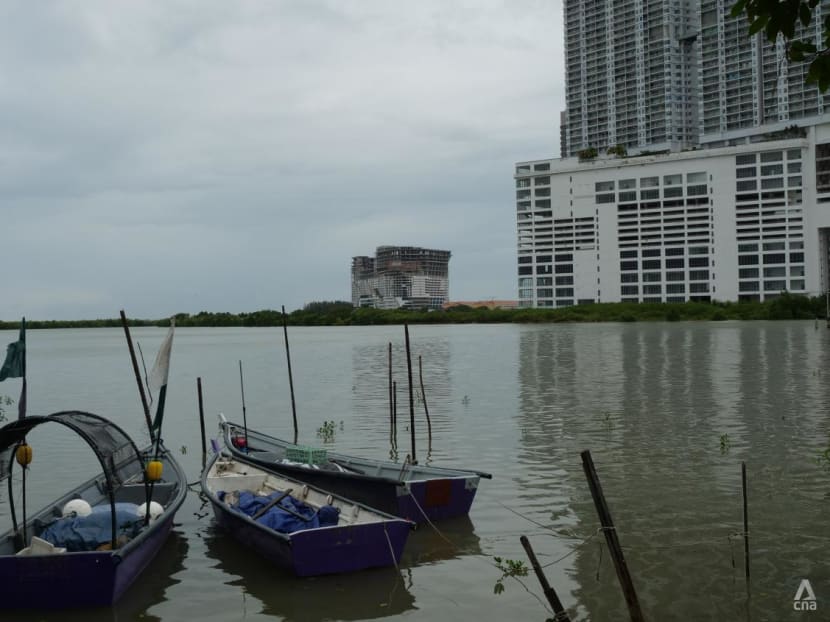
A few government-registered fishing boats bob on the waves at high tide at Portuguese Settlement's waterfront. (Photo: Vincent Tan)
MELAKA: A small fishing boat gently bobbed as waves flowed and ebbed along the seawall next to the Portuguese Settlement’s privately-operated car park, while political banners fluttered in the sea breeze.
It was late afternoon on Wednesday (Nov 17) and fishermen had already returned on the tide to the jetty located a few hundred metres away at the mouth of a Melaka River tributary.
In front of the Portuguese Settlement, located less than 4km from Melaka's town centre, the once open waterfront is now a small lagoon, with a narrow inlet leading to the open sea.
Massive sandbanks have appeared in front of the settlement, eventually threatening to entirely close off the waterfront. The settlement is home to the Kristang people, an ethnic group of mixed Portuguese and Melakan descent.
The settlement’s former regedor (headman) Peter Gomes said land reclamation spearheaded by the state governments along the Melaka coastline has been going on for the past two decades, and fishing communities have been impacted by the activities.
On some parts of these reclaimed stretches, construction of high-rise and landed residences as well as commercial properties have already begun, but a lot of the land is empty bush growth.
Fishing communities such as those in the settlement and up to as far as Klebang have been impacted directly as their access to the sea is slowly restricted. The amount of catch has also decreased, forcing them to sail out further and taking on more costs and safety risks.
Fishermen in other parts of the state’s coast also reported that their catches have dwindled, as shoreline habitats are destroyed when sand is extracted and the seabed replaced with mud.
Land reclamation is one of the hot button issues in the ongoing state election.
While Barisan Nasional (BN) leaders such as former state speaker Ab Rauf Yusoh and caretaker chief minister Sulaiman Md Ali defended the land reclamation, other competing coalitions have said they will re-evaluate the viability of these projects.
For the fisherfolk living along the coastline, these political parties’ stances on the issue will be a deciding factor in how they vote this Saturday.
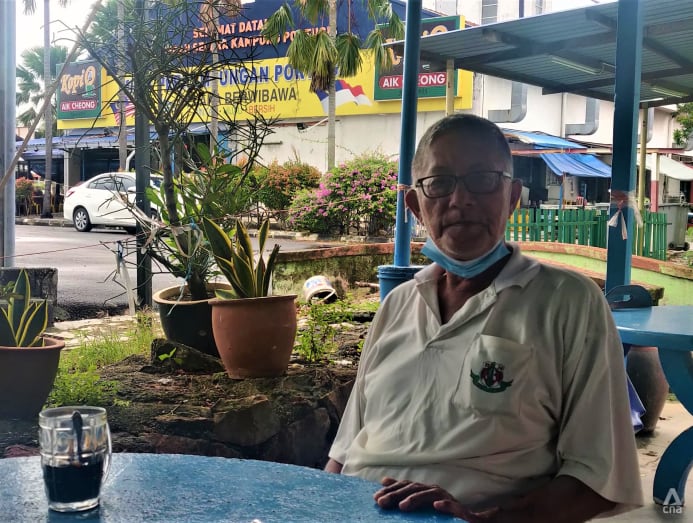
FORCED TO VENTURE INTO DEEPER WATERS
Kampung Pernu, located 9km south of the Portuguese Settlement and along the road to Muar, Johor, hosts a number of ikan bakar (grilled fish) stalls at the Umbai jetty.
The village in the Teluk Mas constituency is also one of two launch points for boat trips to the nearby Pulau Besar island for daytrippers.
Fisherman Mohd Shah Izwan Saptu, 39, who has been fishing the local water since 11, said even if there was no reclamation in front of the local shore, they were still impacted by developments further north.
“The reclamation has caused our catches to decrease year by year.”
“Previously, we could catch up to 70, 80 kg of fish. Some snapper and maybe up to 30, 40 kg of stingray, and the rest depends on the season.”
“Now, our catch has decreased because the reclamation has disturbed the normal fishing areas. The fishes have moved because their usual waters have been disturbed also,” said Mr Mohd Shah.
Another Kampung Pernu fisherman in his 50s, Mr Mazlan Kassim, said the dwindling catch meant that they had to venture further into deeper parts of the Straits of Malacca to find better fishing areas.
This has resulted in increased costs, from the time spent sailing further and fuel expenditure to equipment maintenance.
This was also a complaint raised by Mr Gomes in the Portuguese Settlement.
“Many of our boats are between 5.8m and 6m, and our engines are usually less than 80 horsepower, we are supposed to be sailing near the coast.”
“Sailing out towards the middle of the straits can be dangerous because if you’re not careful, you might stray across the border and the Indonesian marine patrols catch you.”
“But more practically, if you are caught in a storm, our small boats cannot handle the waves and we could capsize,” Mr Gomes said.
The land reclamation has also negatively impacted certain coastal livelihoods.
Acetes shrimp, known locally as “geragau”, is the base ingredient for one of Melaka’s more famous products belacan (shrimp paste), but Mr Gomes and a former shore fisherman, Mr Andrew De Mello, lamented that there was no shrimp to be caught off the shores anymore.
“Now if you want to make belacan Melaka, you have to ‘import’ the shrimp from elsewhere, this has never been heard of,” Mr De Mello said.
Similarly for Kampung Pernu, the silt or mud dumped back into the sea from the reclamation activities had also impacted mussel farms, claimed Mr Mazlan.
“Last time, this used to be a source of extra income, because they could be sold to restaurants, but the mud has covered them all up and they have died out.”
“If you look at the bottom of this jetty, it’s all mud. Even if they try to dredge and clear the bed, the mud just flows back in with the tide,” Mr Mazlan said.
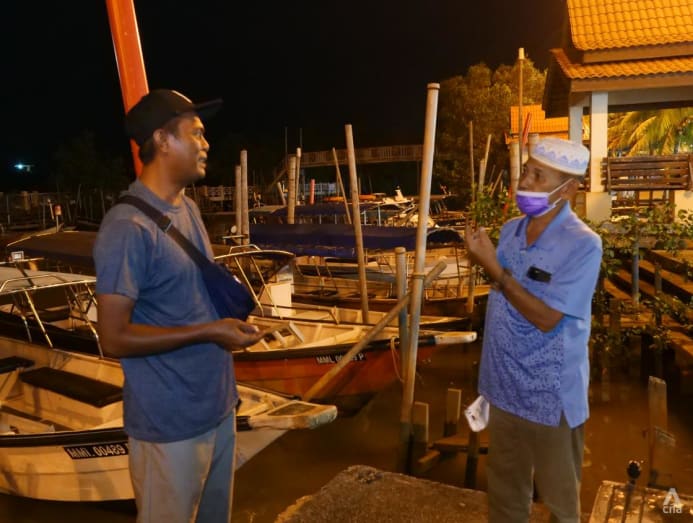
“THE SEA IS WIDE”
Politicians on the campaign trail have weighed in on the reclamation issue.
In a Nov 16 interview with local news portal Malaysiakini, BN’s Mr Ab Rauf, who is standing in the coastal Tanjung Bidara seat north of the reclaimed area, said that this did not affect fishermen and fisheries in the state.
According to the portal’s report, Mr Ab Rauf said the reclamation projects had been important in attracting investments, and fishermen could still earn a living as the “sea is wide”.
The state’s United Malays National Organisation (UMNO) liaison chairman and a member of the party’s supreme council added that the reclamation had not happened just under Mr Sulaiman’s administration.
Melaka was under the rule of BN until the state administration fell into the hands of Pakatan Harapan (PH) in the 2018 general election.
In late February 2020, PH lost its slim majority in the 28-seat assembly following the exodus of Parti Pribumi Bersatu Malaysia (Bersatu) from the coalition at the federal level. UMNO’s Mr Sulaiman was appointed the chief minister, until four assemblymen withdrew their support for him last month, triggering the state election.
Land reclamation had been taking place in the last two decades. Buildings such as Mahkota Parade, a shopping centre, was built on reclaimed land. Man-made island Pulau Melaka, totalling 90 ha, was reclaimed in the 1990s.
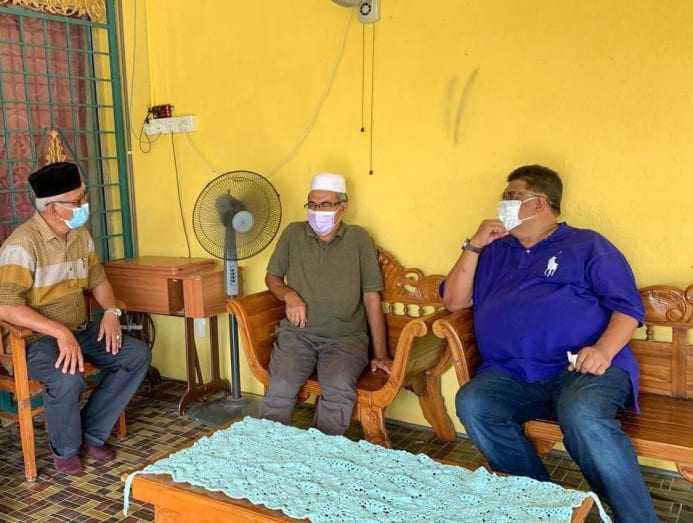
Mr Sulaiman, speaking to TV3 on its “Soal Rakyat” segment on Nov 16, stated that the Melaka Waterfront Economic Zone (M-WEZ) development had the potential to be a new economic catalyst for Melaka, enabling it to compete with Singapore and Penang which were more economically developed despite their small land area.
The caretaker chief minister said Melaka had not been included in previous economic corridors formulated by the federal government.
“We don’t just want Melaka to be a weekend tourism destination, but as a business centre. Hence, M-WEZ is an economic catalyst for future generations,” he said.
He said in the interview that the state government would build better facilities for the fishing communities to address their concerns.
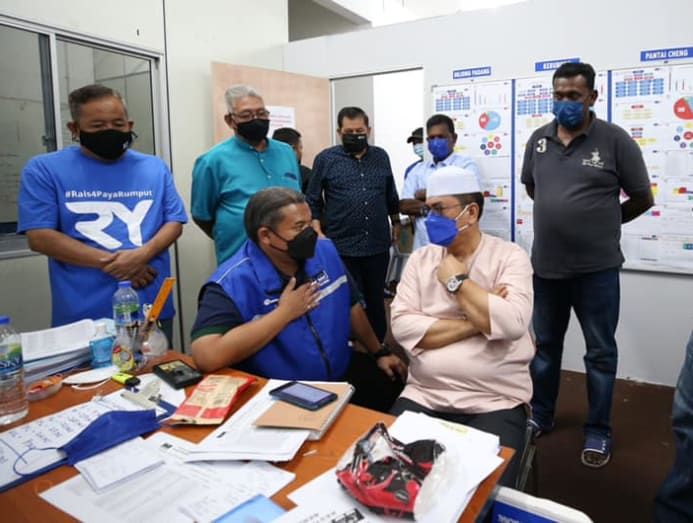
According to its website, M-WEZ is an integrated development concept in the coastal sea reclamation area of Melaka. Spanning 25,000 acres of land along 33km of the coast, it will be a “game changer or economic enabler for Melaka”.
Mr Sulaiman explained in a press conference the following day that M-WEZ meant to consolidate the planning and development of all land reclamation projects that have been taking place since the fourth chief minister’s administration from 1974.
“Up until today, I have said, the area is about 11,000 acres … More than 56 concessions have been given for land reclamation works,” he said in Ayer Keroh.
Of that approved 11,000 acres, only 3,000 acres had been reclaimed, and only 300 acres had been developed, he added.
“WHERE WE CAN RE-EVALUATE, WE WILL RE-EVALUATE”
Meanwhile, BN’s opponents - PH and Perikatan Nasional (PN) - have promised to review the reclamation projects.
Speaking after visiting the fishermen’s jetty at Klebang with local PH candidate Gue Teck on Nov 17, state PH chairman and Bukit Katil candidate Adly Zahari acknowledged the locality was one of the coastal areas most affected by land reclamation.
“Although we know that the land is for the purpose of development, it should be controlled according to the needs of the development,” the former PH chief minister said.
He added that while the purpose of development was to provide employment opportunities, much of the reclaimed land was lying idle.
“It is not being developed and not providing any employment,” he said.
Mr Adly said developing the existing reclaimed land should be the government’s focus, instead of looking at new land reclamations.
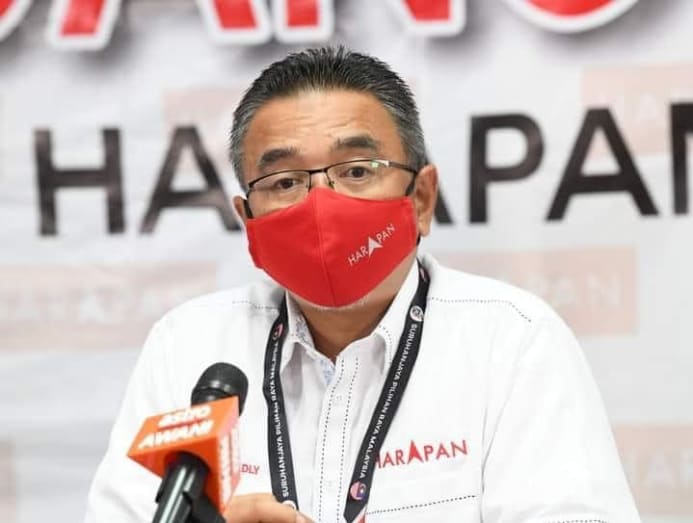
“In our 22 months (in power), as an example, we cancelled all the land reclamations around Pulau Upeh, up to 500m from the island in 2018.”
“There is no need for the whole area to be reclaimed, because the space for small fishermen should also be taken into account,” Mr Adly said.
He also took issue with Mr Ab Rauf’s statement that the “sea is wide”, noting that the fishermen’s equipment did not permit them to go too far out into the straits for safety reasons.
Another factor for controlling land reclamation, he added, was to ensure Melaka had sufficient fish stock for its food security.
He noted that under his administration, the state government had marked out the coastline from Kampung Pernu to Sungai Rambai and prohibited reclamation for this purpose.
“So if PH becomes the government, we will re-evaluate. Only certain areas will be allowed to continue land reclamation.”
“And where we can re-evaluate, we will re-evaluate,” he told the press after the jetty visit.
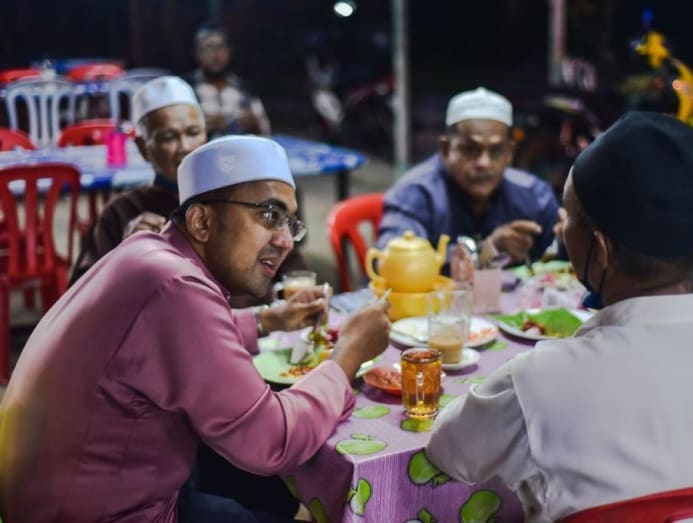
State PN chairman Mohd Rafiq Naizamohideen, who is standing in Telok Mas (where Kampung Pernu is located), told Malaysiakini that a Melaka PN government would review the economic viability of M-WEZ if it comes to power.
He was quoted as stating that a PN-led state government would study the feasibility of M-WEZ and how far it would benefit the state and the people.
"In developing our state, we must make sure that no groups are neglected, like these fisherfolk. We must ensure their welfare,” Mr Mohd Rafiq said in the interview.
However, Mr Mohd Rafiq was among the 16 legislators who had voted for the enactment on M-WEZ during its second reading back in the September state assembly. The enactment has been passed.
In the same interview, the Bersatu vice-president explained that he could not have voted against the enactment, citing party discipline. PN was a minority in the BN-led state government, he said.
LOSS OF HERITAGE
For people like Mr Gomes and Mr De Mello, losing the sea is more than just an economic loss, but also a cultural one.
Festa San Pedro, in honour of St Peter as the patron saint of fishermen, is a major celebration for the settlement and begins every Jun 29.
One of the main highlights of the festival is the settlement's fishermen hauling their boats up to the village square to be blessed. This harks back to when fishing was a major source of income for the Kristang community.
“We still go out to fish, and if we can no longer fish, there is no point to the festival and we lose a part of our heritage, our identity,” Mr Gomes said.
For the sandbanks already choking his settlement’s waterfront, Mr Gomes said there was not much they could do to alter the seascape.
“They plan to reclaim three big pieces of land here. The first one, we can’t do anything about it. But I promised the fishermen, we’ll fight the next two all the way,” Mr Gomes said.
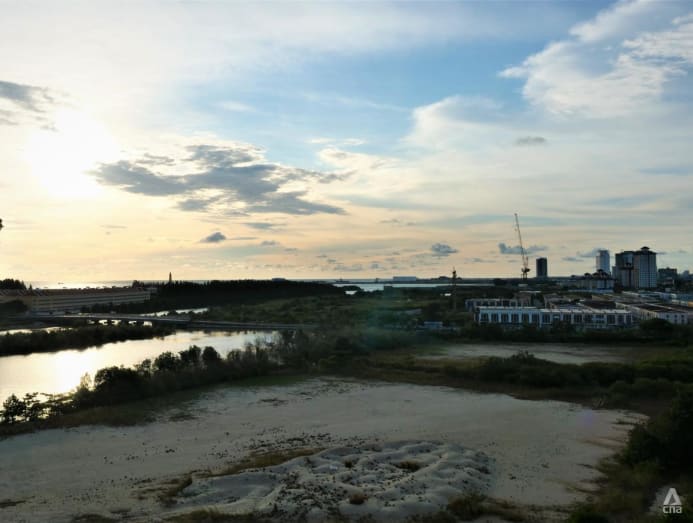
In Kampung Pernu, the fishermen said the loss of fish stocks in other areas had forced their counterparts to come into their waters.
“And this has sparked arguments between the locals and the new fishermen because who wants to see their local fish supply depleted by outsiders?” Mr Mazlan said.
The Kampung Pernu fisherfolk said they would be monitoring statements from each political camp before voting on Nov 20.
“We will see who actually address our concerns and what they intend to do to help our plight before Saturday,” Mr Mohd Shah Izwan added.
“But so far, no one has said anything concrete,” he said.









